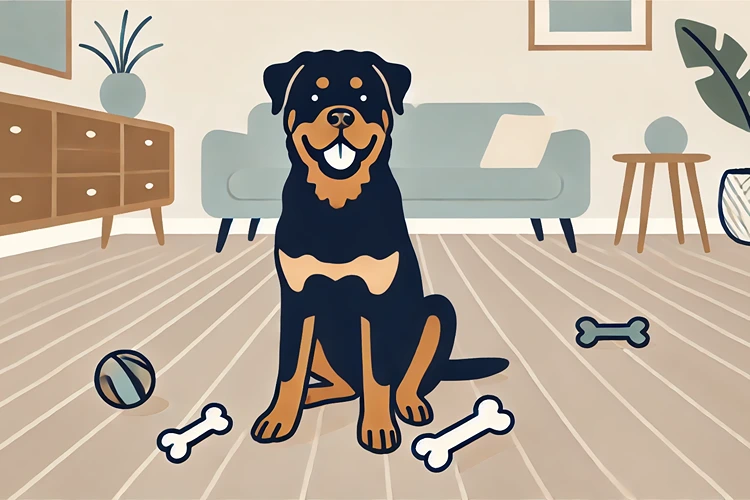Rottweilers, like many dogs, communicate through barking. But if your Rottweiler seems to be barking excessively, it’s essential to figure out why. Is it because they’re bored, anxious, or trying to alert you to something? Understanding the root cause of the behavior is key to addressing it effectively.
There are several common reasons why Rottweilers may bark more than usual. Some bark out of boredom when left alone for extended periods. Others may be reacting to external stimuli, such as passing cars or unfamiliar people. And sometimes, barking can be a sign of anxiety or fear. By identifying the reason behind the barking, you can take steps to reduce it in a way that is healthy and beneficial for both you and your dog.
What Are the Main Causes of Excessive Barking?
There are a variety of factors that could be contributing to your Rottweiler’s barking. Here are some of the most common:
- Boredom: Rottweilers are active dogs that need plenty of physical and mental stimulation. When they don’t get enough, they may resort to barking as a way to entertain themselves.
- Anxiety: Some Rottweilers may bark excessively when they’re feeling anxious or scared. This could be separation anxiety or fear of certain noises or situations.
- Attention-seeking: If your Rottweiler barks and you immediately respond by giving them attention (even if it’s negative), they may learn that barking is an effective way to get what they want.
- Alert barking: Many Rottweilers are natural watchdogs, and they’ll bark to alert you to anything they see as a threat. While this is a valuable trait, it can become excessive if they’re constantly reacting to everyday noises.
How to Train Your Rottweiler to Reduce Excessive Barking
Once you’ve identified the cause of your Rottweiler’s barking, the next step is to address the behavior through training. Training takes patience and consistency, but it’s one of the most effective ways to reduce excessive barking in Rottweilers.
Does Positive Reinforcement Work?
Positive reinforcement is one of the most recommended training techniques for addressing excessive barking in Rottweilers. This approach focuses on rewarding your dog for calm, quiet behavior rather than punishing them for barking. When your Rottweiler stops barking, immediately reward them with praise or a treat. Over time, they’ll learn that being quiet gets them a positive response.
Paw-some Tip:
Always be consistent with rewards. If you only reward quiet behavior occasionally, your Rottweiler may become confused about what is expected of them. Try to be consistent with both your responses and your timing.
Environmental Changes to Reduce Barking

In addition to training, making changes to your Rottweiler’s environment can also help reduce excessive barking. If your dog is barking out of boredom or frustration, for example, providing them with more mental and physical stimulation can make a big difference.
Can Exercise Help?
Yes! Rottweilers are active dogs that need regular exercise to stay healthy and happy. A lack of exercise can lead to boredom and pent-up energy, which often manifests as excessive barking. Taking your Rottweiler for daily walks, playing games like fetch, or providing them with interactive toys can go a long way toward reducing unwanted barking.
Paw-some Tip:
Try rotating your Rottweiler’s toys to keep them engaged. Introducing a “new” toy every few days can help prevent boredom and reduce barking caused by a lack of stimulation.
How to Handle Barking When You’re Not Home
One of the most common times for excessive barking to occur is when Rottweilers are left alone. Separation anxiety and boredom are common triggers for barking when their owners are away. Luckily, there are several strategies you can use to address this issue.
Is Crate Training an Option?
Crate training can be a useful tool for helping Rottweilers feel safe and secure when left alone. When introduced properly, the crate becomes a comfortable space where they can relax. Start by making the crate a positive place, offering treats and toys inside, and gradually building up the amount of time your Rottweiler spends in the crate. However, avoid using the crate as a punishment, as this can increase anxiety and lead to more barking.
Can Background Noise Help Calm Your Dog?
Many dogs find comfort in background noise, especially when left alone. Consider leaving the radio or television on while you’re out. The noise can make them feel less isolated and may help reduce barking caused by anxiety or boredom.
Rottie Stats:
A recent study shows that approximately 20% of dogs experience separation anxiety, which can lead to excessive barking when left alone.
Managing Triggers to Reduce Barking
Sometimes, excessive barking in Rottweilers is triggered by specific stimuli. This could be anything from the mail carrier to unfamiliar sounds in the neighborhood. Identifying and managing these triggers can help reduce barking significantly.
How Can You Identify Common Triggers?
Start by paying attention to when and why your Rottweiler barks. Do they bark every time someone walks by the house? Are they barking at the sound of the doorbell? Once you understand the specific triggers, you can work on desensitizing your dog to those stimuli.
What Is Desensitization, and How Can It Help?
Desensitization is the process of gradually exposing your dog to the trigger in a controlled way, helping them become less reactive over time. For instance, if your Rottweiler barks at the doorbell, you can practice by ringing the doorbell softly and rewarding your dog when they remain quiet. Slowly increase the volume over several sessions, continuing to reward calm behavior.
Common Triggers for Excessive Barking and How to Address Them
| Trigger | How It Affects Barking | Solution |
|---|---|---|
| Mail Carrier/Delivery Person | Triggers alert barking as the dog perceives a threat at the door | Desensitize the dog by rewarding calm behavior when the carrier approaches |
| Other Dogs Barking | Can cause reactive barking, especially in territorial dogs | Use soundproofing techniques and reward your dog for ignoring outside barking |
| Separation Anxiety | Triggers excessive barking when the dog is left alone | Work on crate training and create a calming environment to reduce anxiety |
| Visitors or Strangers | Rottweilers may bark to alert their owners of new people | Teach the “quiet” command and introduce visitors in a calm manner |
| Lack of Exercise | Excess energy can lead to boredom and excessive barking | Ensure your Rottweiler gets plenty of daily physical and mental stimulation |
Paw-some Tip:
Desensitization takes time and patience. It’s important not to rush the process. If your Rottweiler becomes too anxious or starts barking, take a step back and go slower.
Teaching the “Quiet” Command
One of the most effective techniques for addressing excessive barking is teaching your Rottweiler a “quiet” command. This can be a game-changer, especially when your dog is barking in response to a specific situation.
How Do You Teach the “Quiet” Command?
Start by encouraging your Rottweiler to bark on command (you can do this by knocking on a door or ringing a bell). Once they start barking, hold up a treat and calmly say “quiet.” When they stop barking, reward them immediately with the treat and praise. Repeat this several times during training sessions until your dog understands the “quiet” command.
Consistency is key. Make sure to practice this command in different environments and situations so that your Rottweiler learns to respond no matter what the circumstances.
What If the “Quiet” Command Doesn’t Work?
If your Rottweiler is still barking excessively despite training, it could be that they need more time, or that the underlying cause of the barking hasn’t been fully addressed. In these cases, it’s important to stay patient and consistent with the training. Avoid yelling at your dog, as this can increase anxiety and may make the barking worse.
Paw-some Tip:
While teaching the “quiet” command, try to keep training sessions short and fun. This will help your Rottweiler stay engaged and more likely to pick up the new command quickly.
Dealing with Persistent Barking Issues
Sometimes, excessive barking in Rottweilers can persist despite training and environmental changes. In these cases, there may be underlying behavioral or medical issues contributing to the problem. It’s important not to ignore persistent barking, as it can be a sign that something deeper is going on.
When Should You Seek Professional Help?
If your Rottweiler’s barking is out of control and none of the above techniques seem to be helping, it might be time to consult a professional dog trainer or behaviorist. A professional can help you better understand your dog’s behavior and create a customized training plan. They can also work with you to rule out any medical issues that could be contributing to the excessive barking.
In some cases, excessive barking can be linked to anxiety disorders, in which case a veterinarian or canine behavior specialist might recommend specific therapies or treatments to help manage the condition.
Are There Medical Reasons for Excessive Barking?
While barking is typically a behavioral issue, there are some medical conditions that can cause a dog to bark more than usual. Hearing loss, cognitive dysfunction (in older dogs), or even pain can all contribute to excessive barking. If you’ve ruled out common behavioral triggers and your Rottweiler continues to bark excessively, a vet check-up might be a good idea to rule out any underlying medical conditions.
Rottie Stats:
According to a study published by the American Veterinary Society of Animal Behavior, approximately 15% of dogs over the age of 8 experience cognitive decline, which can sometimes result in increased barking.
Staying Consistent with Training
Consistency is one of the most important elements when addressing excessive barking in Rottweilers. Whether you’re using positive reinforcement or working on desensitization, it’s crucial to stick to your training plan and not give in to frustration. Rottweilers are intelligent and loyal dogs, but they can be stubborn at times. Patience and consistency will yield the best results in the long run.
What Are the Most Common Mistakes to Avoid?
One of the biggest mistakes dog owners make is being inconsistent with training. For instance, if you only reward your dog for quiet behavior some of the time, they may become confused and not understand what’s expected of them. Additionally, avoid punishing your dog for barking, as this can lead to anxiety and make the behavior worse.
It’s also important to set realistic expectations. Training a Rottweiler to stop excessive barking won’t happen overnight, and it’s important to stay patient and consistent in your approach.
Creating a Calm Environment for Your Rottweiler
A calm environment can go a long way in reducing excessive barking. Rottweilers, like many dogs, are highly sensitive to their surroundings. If they feel stressed or overwhelmed, barking can become their way of expressing discomfort. Here are some tips for creating a peaceful environment that will help calm your Rottweiler and reduce barking.
How Does Routine Impact Your Dog’s Behavior?
Dogs thrive on routine. When your Rottweiler knows what to expect each day, it can help reduce anxiety and stress, which are often triggers for excessive barking. Make sure your dog gets regular exercise, mealtimes, and rest periods. A consistent routine helps your dog feel more secure and can prevent unwanted behaviors like barking.
What Can You Do to Minimize External Noise?
If your Rottweiler barks at every little sound, minimizing external noise can help create a more peaceful environment. Consider using white noise machines, calming music, or soundproofing materials around the house to block out noises that may trigger barking. Closing blinds or curtains can also reduce visual stimuli that might be causing your dog to react.
Paw-some Tip:
If your Rottweiler is particularly reactive to outdoor sounds, try designating a quiet space in your home where they can retreat when they feel overstimulated. Make this area comfortable with their bed, toys, and even a favorite blanket.
Are There Alternative Approaches to Reducing Barking?
While traditional training techniques work for many Rottweilers, some dogs may respond better to alternative approaches. From calming products to specialized training tools, there are various methods to help manage excessive barking.
Can Calming Products Help?
There are several products on the market designed to calm anxious or stressed dogs. Calming collars, sprays, and diffusers infused with natural ingredients like lavender or chamomile may help reduce anxiety-induced barking. These products work best when combined with behavioral training and a calm environment.
What About Anti-Bark Collars?
While some owners opt for anti-bark collars, it’s important to use them cautiously. These collars often emit a sound, vibration, or mild static shock when your dog barks. However, it’s crucial to ensure the collar is used correctly and humanely. For many Rottweilers, positive reinforcement and environmental changes will be more effective and less stressful than using an anti-bark collar.
Long-Term Strategies for Addressing Excessive Barking
Addressing excessive barking in Rottweilers is a long-term process that requires commitment and consistency. The key is to be patient, as lasting results take time. Developing a routine, sticking with training methods, and maintaining a calm environment will all contribute to long-term success.
How Can Socialization Help with Barking?
One of the most effective ways to reduce reactive barking in Rottweilers is through socialization. Exposing your dog to different people, dogs, and environments from a young age can help them feel more comfortable and less reactive in unfamiliar situations. Well-socialized dogs are generally calmer and less likely to bark excessively.
If your Rottweiler isn’t well-socialized, you can still help them become more comfortable by gradually introducing them to new experiences in a controlled and positive way. For instance, you can take them to a dog park during off-peak hours to avoid overwhelming them with too many new stimuli at once.
Paw-some Tip:
Regular playdates with other well-behaved dogs can help your Rottweiler become more comfortable in social settings. Over time, they’ll learn that not every person or dog they encounter is a threat, which can reduce barking.
What Is the Role of Consistency in Behavior Modification?
Consistency is key when it comes to modifying your Rottweiler’s barking behavior. Stick to a consistent training routine, use the same commands, and always reinforce quiet behavior with positive rewards. Inconsistency will only confuse your dog and make it harder for them to understand what’s expected of them.
Can You Fully Eliminate Barking?
While it’s possible to significantly reduce excessive barking, it’s important to remember that barking is a natural form of communication for dogs. The goal isn’t to eliminate barking entirely but to ensure your Rottweiler barks at appropriate times and in moderation. With patience, training, and environmental adjustments, you can reduce excessive barking while still allowing your dog to express themselves when necessary.
FAQs
Wrapping Up
Addressing excessive barking in Rottweilers takes time, patience, and a comprehensive approach. Understanding the root causes—whether boredom, anxiety, or environmental triggers—sets the foundation for effective solutions. By using positive reinforcement, teaching commands like “quiet,” and adjusting your Rottweiler’s environment, you can create lasting change and reduce unnecessary barking.
Keep in mind that barking is a natural form of communication, and your goal is not to eliminate it entirely, but to ensure it’s appropriate and manageable. With consistency, training, and understanding, you and your Rottweiler can enjoy a quieter, more peaceful home. Keep the process positive, and remember that every dog is unique, so some methods may take more time than others.




